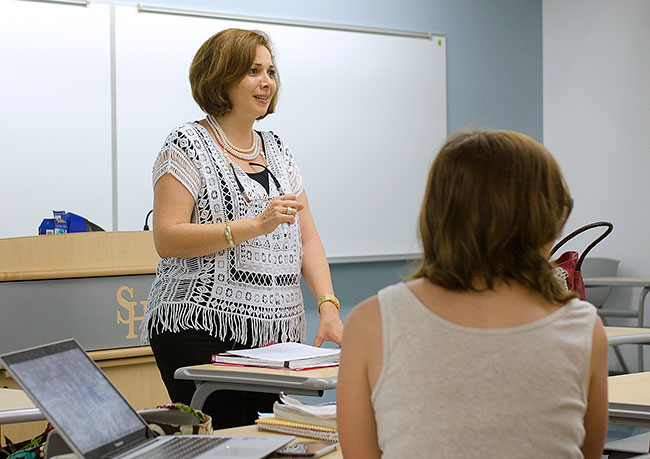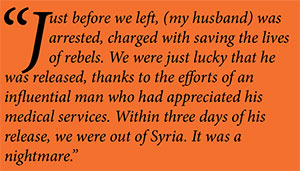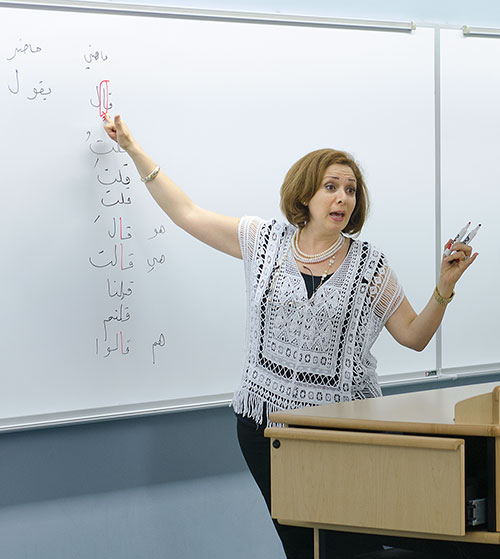Arabic Prof Works To Dispel Myths About Culture, War Through Film, Literature
Aug. 12, 2014
SHSU Media Contact: Jennifer Gauntt
Story By: Linda Gilchriest
 |
| In her "Special Topics in Arabic Culture" classroom, Samar Zahrawi works to educate students on gender issues and class distinction in the Arab world. While she finds that many students are surprised by what they learn, Zahrawi, herself, is an example of women from that region who maintain power and status within their families. She, her husband and two children escaped war-torn Syria last year. —Photos by Brian Blalock |
Samar Zahrawi has seen first hand the good and bad of humanity.
After escaping from Syria last year, she and her family made their way to the Houston area and, Zahrawi, to a classroom at Sam Houston State University where, as an assistant professor of Arabic language and culture in SHSU’s foreign languages department, she shares a personal view of the Arab world through lectures and film.
In her “Special Topics in Arabic Culture” class, Zahrawi works to open her students’ eyes to the universality of the human condition through history and film, and she said she is getting positive feedback from the class.
“There are 22 Arab states, so I have divided them into three regions: the Levant (Syria, Lebanon, Iraq, Jordan and Palestine), the Arabic Peninsula (Saudi Arabia, Yemen, Bahrain UAE) and North Africa (Egypt, Libya, Algeria, Tunisia and Morocco). There is a distinctive culture and flavor to each one of these regions,” Zahrawi said. “My concern is not only historical and political, but also social and cultural. So I speak about the history of that region; just an overview of what happened.”
While her emphasis is on the modern times, she gives an overview of ancient civilizations, both religions of Christianity and Islam, the Ottoman Empire and the occupation and the French or British Mandate. She also covers the political and cultural climate of the region.
“I do this as an overview because the students need to know what happened and why it did,” Zahrawi said.
 The meat of the course includes a discussion of films, short stories and plays written or produced in that area.
The meat of the course includes a discussion of films, short stories and plays written or produced in that area.
“Not only do students see conflicts, violence, political corruption and sometimes, fundamentalism, they also see a human face in distress and people in their interactions; they see human beings in their strife to reform their condition and to make it in the world,” Zahrawi said. “Sometimes my students express their surprise that they such issues as sexuality, individuality, a yearning for freedom are openly discussed in an Arab country.”
They also appreciate the sense of humor, the art of filmmaking and the use of music in these films, the professor said.
An example of this can be seen in her presentation of the Lebanese film “Where Do We Go Now," directed by Nadine Labki. It is the story of Christians and Muslims who had been coexisting for hundreds of years in a remote village but start to fight when the men learn of the violence breaking out at the Lebanese capital of Beirut.
“The women are very careful to muffle all the differences between the men. Sometimes they burn the newspapers, or switch off the TVs, or take off the antennas,” Zahrawi said. “Once they had the men drugged using cookies at a party, and while they were asleep, the women buried all the weapons.
“They changed the village so only women would have access to the guns. That didn’t work, so the women then converted to each others’ religion,” she said. “Then they would tell their husbands, ‘Look I am one of them now. What do you want to do about it? Are you my enemy now?’
“It’s all fiction, but it is a nice feminist film. We see a very realistic look at how Muslims and Christians can live together,” Zahrawi said. “The message from the film is that violence is not coming from within. They have been living with each other for hundreds of years; the trouble is coming from outside. Men are capable of making war while the women are breeders and pacifist people. It is women who have to govern or take control of the community.”
She said her students tend to be surprised to see that Arab women are that strong.
“Actually, Arab women are very powerful at home; however, they are not represented in the public life, in the work force or the government,” Zahrawi said. “So this is the first time students are exposed to this idea; they see that as long as the women are conforming to the rules of her society, they maintain power and status within their families. If she wants to break away from it, she loses all her rights.”
Where Art and Life Converge
Zahrawi has not shared much of her own drama with her students—her husband’s arrest, her car being shot, her home being bombarded, her family being terrorized by the frequent bombings in her Syrian homeland.
“I could speak about the Syrian war forever, but in my class I don’t speak about anything personal,” she said. “I have included the Arab Spring in the curriculum, so I unveiled facts about the tyranny of the present dictator in power in Syria, facts about the eruption of the revolution for freedom and democracy, the Iranian interference and the evolution of the revolution into a sectarian civil war.
“It is a hot topic nowadays. Everyone is interested in knowing what is going on in Syria.”
She still has friends in Syria but her immediate family is with her in Texas. Her siblings and other family members are living in Dubai and Saudi Arabia, but her husband’s family continues to live in Syria.
 |
| Zahrawi teaches classes on the Arabic language and culture. |
“The people who could leave have already left. The people who couldn’t are stuck there,” she said. “In my hometown, in my neighborhood, there are about half a million people being bombarded at the moment. It is very heartbreaking.”
She, her husband, Dr. Bard Samman, and their two children lived in a city named Homs, north of Damascus. She said she had to get her children, ages 17 and 10, out of that dangerous environment.
“Nowadays, the story inside Syria is extremely complicated,” Zahrawi said. “It started being extremely clear; the impoverished civilians rose up peacefully against the corrupt government that is governed by a dictator.
“The revolution was well received by the majority who needed democracy and freedom,” she said. “They needed free elections, just like what happened in the neighboring countries, in Egypt and Tunisia. Libya was a very sad story—there, it was very violent and we were dreading that we would turn into the scenario of Libya. We wish now we would have that scenario, you know, for six months and that’s it.”
Rebels swarmed the streets with song and dance, carrying banners calling for freedom, unity and the overthrow of the president. The street demonstrations were cracked down with bullets first and then artillery shells and bombs. The army split, and ISIS was implanted erroneously within the rebels.
Eventually, the president manipulated the situation and transformed the conflict into sectarian war in order to give legitimacy to his war against fundamentalism, she said.
“Now the world media is showing the revolution as the revolution of the fundamentalists, which it is not,” Zahrawi said. “It is the revolution of the people seeking freedom, but it has become so complicated. Now, in fact, there are some fundamentalists side-by-side with the real people that are very moderate people. So it is not going to be solved that easily.”
It was not difficult for Zahrawi to get out of the country.
“I had commitment towards my work as professor at a state university there,” she said. “I was pro-rebels, but not a rebel myself; I was just a person who was doing my best in order to continue working and surviving, so I could go out and in.”
Her husband’s story was quite different. As an orthopedic surgeon, Samman worked at the local hospital where he was called upon daily to assist the wounded.
“Just before we left, he was arrested, charged with saving the lives of rebels,” Zahrawi said. “We were just lucky that he was released, thanks to the efforts of an influential man who had appreciated his medical services. Within three days of his release, we were out of Syria. It was a nightmare.”
The family settled in Houston, where they had relatives. When Zahrawi saw an Internet posting for a job at SHSU, she applied and got it. She had been a teacher in Syria, Saudi Arabia and at the University of Leeds in England and a Fulbright Scholar at SUNY Binghamton.
It was an easy decision when she considered her concern for her children, for what they saw in Syria, particularly for her daughter, Yara, who had worked at the hospital, taking care of the wounded.
“I was afraid for her, but she had so much empathy and courage. She was very strong and since that day, she has decided to go into medicine,” Zahrawi said. “She has adjusted well and is looking forward to going to university.
“She is on the junior varsity swim team (at Cy-Falls High School), which is an accomplishment, since she did not get any outdoor exercise for more than two years,” Zahrawi said. “They could not go outside because you were afraid they would be kidnapped or might be shot. So they would stay inside, close to the corridors and away from the windows.”
Since coming here, Zahrawi said the community and the university have been very welcoming. Having lost her home in Homs, she is grateful to be able to live in single-family home.
“I have a garden and a garage,” she said.
Zahrawi is teaching “Special Topics in Arabic Culture” (ARAB 4370) this fall. She also plans to expose the campus to the Arab culture via a day of fun, food, Arab music, and, perhaps, other cultural events.
- END -
This page maintained by SHSU's Communications Office
Associate Director: Julia May
Manager: Jennifer Gauntt
Located in the 115 Administration Building
Telephone: 936.294.1836; Fax: 936.294.1834
Please send comments, corrections, news tips to Today@Sam.edu.

 SamWeb
SamWeb My Sam
My Sam E-mail
E-mail

